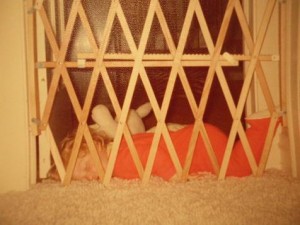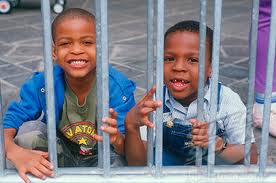When our son Nelson was 19 months, we moved him from the nursery to a second bedroom, because another baby was on the way. Even though we put him in a second crib, he was excited about his new room because of a big-boy-bed waiting in the corner.
Just after we moved him, he learned to climb out of his crib. And like most toddlers who figure that out, he began refusing to stay in his room. After a story and prayer time each night, we’d sing, then tuck him in. But when we got to the bottom of the stairs, he’d be right behind us.
This dilemma grew from cute to exasperating, and nothing worked to keep him in his room. Eventually we decided to gate him in. That worked for about 10 minutes until he learned to scale the gate. Nate made a trip to the store for a second gate, and with one above the other, we finally penned him in.
We paid a price for success, however. Rather than surrender quietly, Nelson used his room as a giant playpen, emptying drawers, pulling them out to use as ladders, removing sheets from the two beds, tearing pages out of books. When he tired of playing, he’d fall asleep at the door, often with one arm and one leg outside the gate.
No one likes to be locked in a cage, whether it’s physical or emotional, but sometimes confinement is good.
I remember learning of an experiment at a big-city grade school. Its playground bordered a busy street, and during recess the children played only near the school building, fearful of fast-moving cars. After a fence was built at the edge of the road, the children took advantage of the entire playground. They even played near the fence, just inches from dangerous traffic.
Little Nelson saw his “bars” as a prison. The school children viewed theirs as freedom. Why the difference?
It’s probably a control issue. We told Nelson, “You must stay in your room.” There was no negotiating, and his determination to get out was the result of a desire to buck the system.
The school children were told, “You can play anywhere on the playground.” There were no restrictions. When they hovered near the building, it was because they chose it. When the “bars” went up, they were relieved.
Many people reject religion because they see it as a set of non-negotiable rules that take the fun out of life. But if they understood that God’s structure protects them from harm, they might view it as a relief.
God is the one who gave us free will in the first place. We can fight against his laws (which include natural laws) or submit to them, believing his fences actually bring freedom. Within his boundaries, he gives us unlimited choices, but doing things our own way just to buck the system is foolish.
No toddler understands the importance of going to bed at night. But if we would have taken down Nelson’s gates and let him fall asleep wherever he chose, maybe he’d have chosen his bed.
“The trouble is not with the law, for it is spiritual and good. The trouble is with me, for I am all too human, a slave to sin.” (Romans 7:14)



Always profound and insightful. God’s ways are best.